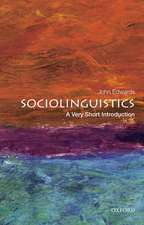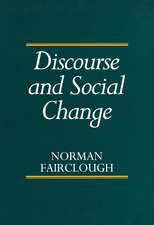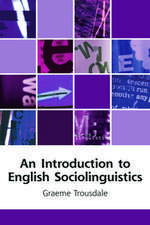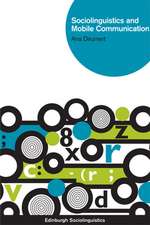The Language Hoax
Autor John H. McWhorteren Limba Engleză Paperback – 23 iun 2016
Japanese has a term that covers both green and blue. Russian has separate terms for dark and light blue. Does this mean that Russians perceive these colors differently from Japanese people? Does language control and limit the way we think?
This short, opinionated book addresses the Sapir-Whorf hypothesis, which argues that the language we speak shapes the way we perceive the world. Linguist John McWhorter argues that while this idea is mesmerizing, it is plainly wrong. It is language that reflects culture and worldview, not the other way around. The fact that a language has only one word for eat, drink, and smoke doesn't mean its speakers don't process the difference between food and beverage, and those who use the same word for blue and green perceive those two colors just as vividly as others do.
McWhorter shows not only how the idea of language as a lens fails but also why we want so badly to believe it: we're eager to celebrate diversity by acknowledging the intelligence of peoples who may not think like we do. Though well-intentioned, our belief in this idea poses an obstacle to a better understanding of human nature and even trivializes the people we seek to celebrate. The reality -- that all humans think alike -- provides another, better way for us to acknowledge the intelligence of all peoples.
Preț: 87.77 lei
Nou
16.79€ • 17.53$ • 13.90£
Carte disponibilă
Livrare economică 14-28 martie
Livrare express 28 februarie-06 martie pentru 24.12 lei
Specificații
ISBN-10: 0190468890
Pagini: 208
Dimensiuni: 124 x 175 x 15 mm
Greutate: 0.16 kg
Editura: Oxford University Press
Colecția OUP USA
Locul publicării:New York, United States
Descriere
Japanese has a term that covers both green and blue. Russian has separate terms for dark and light blue. Does this mean that Russians perceive these colors differently from Japanese people? Does language control and limit the way we think?
This short, opinionated book addresses the Sapir-Whorf hypothesis, which argues that the language we speak shapes the way we perceive the world. Linguist John McWhorter argues that while this idea is mesmerizing, it is plainly wrong. It is language that reflects culture and worldview, not the other way around. The fact that a language has only one word for eat, drink, and smoke doesn't mean its speakers don't process the difference between food and beverage, and those who use the same word for blue and green perceive those two colors just as vividly as others do.
McWhorter shows not only how the idea of language as a lens fails but also why we want so badly to believe it: we're eager to celebrate diversity by acknowledging the intelligence of peoples who may not think like we do. Though well-intentioned, our belief in this idea poses an obstacle to a better understanding of human nature and even trivializes the people we seek to celebrate. The reality -- that all humans think alike -- provides another, better way for us to acknowledge the intelligence of all peoples.
Recenzii
[McWhorter] tackles linguistic determinism
McWhorter is exhaustive, fair-minded, and convincing.
The Language Hoax has a sharp-edged title, but a generous and methodical approach to the evidence on both sides of the 'language-shapes-thought' debate. Nonetheless, John McWhorter has gathered the most comprehensive case for the prosecution out there, which will make both specialists and general readers think again. Besides being provoked, they will also be entertained by this wonderfully written book, which ends with the aim of redeeming our common humanity.
Some popular ideas are worse than wrong
The Language Hoax is a well-written and stimulating book that asks uncomfortable questions and turns common arguments on their head. The author uses examples from an impressive number of languages across the globe to provide counter-examples to claims that may easily be made (and occasionally have been made) about the influence of language on thought... McWhorter's thought-provoking manifesto provides much stuff to think about and keep the discussion on language, culture and thought going. It is suitable for both undergraduate and graduate classes (I just did it in one of mine, in combination with Deutscher's book), to provide answers to the
Notă biografică
John McWhorter is Professor of Linguistics at Columbia University and author of many books, including The Power of Babel: A Natural History of Language, Our Magnificent Bastard Tongue: The Untold Story of English, and What Language Is, What It Isn't, and What It Could Be. He also writes on language, as well as race and cultural issues, as Contributing Editor at The New Republic and Columnist at Time. Hiswork has appeared in The New York Times, Time, and The New Yorker, and he has appeared often on National Public Radio, CSPAN and MSNBC.














